Related Research Articles
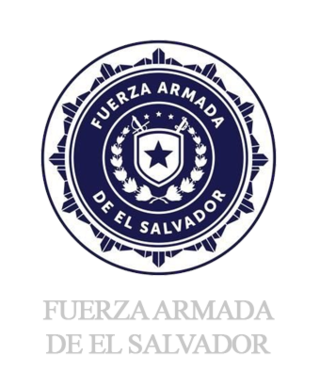
The Armed Forces of El Salvador are the official governmental military forces of El Salvador. The Forces have three branches: the Salvadoran Army, the Salvadoran Air Force and the Navy of El Salvador.

The Chapultepec Peace Accords were a set of peace agreements signed on January 16, 1992, the day in which the Salvadoran Civil War ended. The treaty established peace between the Salvadoran government and the Farabundo Martí National Liberation Front (FMLN). It was signed in Chapultepec Castle, Mexico.
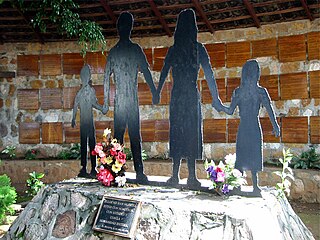
The El Mozote massacre took place both in and around the village of El Mozote, in the Morazán Department, El Salvador, on December 11 and 12, 1981, when the Salvadoran Army killed more than 811 civilians during the Salvadoran Civil War. The army had arrived in the village on the 10th, following clashes with guerrillas in the area. The Salvadoran Army's Atlácatl Battalion, under the orders of Domingo Monterrosa was responsible for the massacre.

Alfredo Félix Cristiani Burkard is a Salvadoran politician who was President of El Salvador from 1989 to 1994.

José Napoleón Duarte Fuentes was a Salvadoran politician who served as President of El Salvador from 1 June 1984 to 1 June 1989. He was mayor of San Salvador before running for president in 1972. He lost, but the election is widely viewed as fraudulent. Following a coup d'état in 1979, Duarte led the subsequent civil-military Junta from 1980 to 1982. He was then elected president in 1984, defeating ARENA party leader Roberto D'Aubuisson.
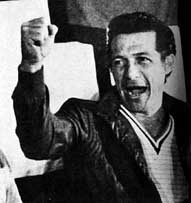
Roberto D'Aubuisson Arrieta was a Salvadoran military officer, neo-fascist politician, and death squad leader. In 1981, he co-founded and became the first leader of the far-right Nationalist Republican Alliance (ARENA) and served as president of the Legislative Assembly from 1982 to 1983. He was a presidential candidate for 1984 presidential election, losing in the second round to José Napoleón Duarte, the former president of the Revolutionary Government Junta.
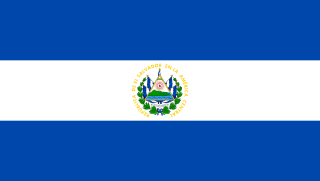
The Revolutionary Government Junta was the name of three consecutive joint civilian-military dictatorships that ruled El Salvador between 15 October 1979 and 2 May 1982.
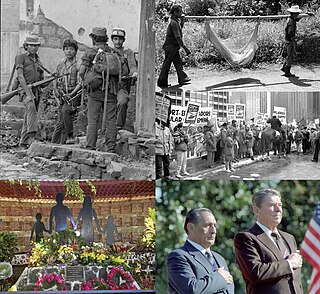
The Salvadoran Civil War was a twelve-year period of civil war in El Salvador that was fought between the government of El Salvador and the Farabundo Martí National Liberation Front (FMLN), a coalition or "umbrella organization" of left-wing groups backed by the Cuban regime of Fidel Castro as well as the Soviet Union. A coup on 15 October 1979 followed by government killings of anti-coup protesters is widely seen as the start of civil war. The war did not formally end until after the collapse of the Soviet Union, when, on 16 January 1992 the Chapultepec Peace Accords were signed in Mexico City.
The Atlácatl Battalion was a rapid-response, counter-insurgency battalion of the Salvadoran Army created in 1981. It was implicated in some of the most infamous massacres of the Salvadoran Civil War.

The National Civil Police of El Salvador, also known as PNC, is the national civilian police of El Salvador. Although the National Civil Police is not part of the Armed Forces of El Salvador, it constitutes along with them the "Civilian Force". It was created after the Peace Accords were signed at Chapultepec Castle in Mexico City on January 16, 1992, and began the operations on February 1, 1993, in order to guarantee the order, safety, and the public tranquility for every single corner of El Salvador. The PNC is a replacement of the National Police of El Salvador.

The National Guard was the national gendarmerie of El Salvador.
ORDEN or Organización Democrática Nacionalista was a Salvadoran paramilitary organization founded under the military rule of Julio Adalberto Rivera, headed by José Alberto Medrano. ORDEN helped control the 1972 elections, in which reform-minded José Napoleón Duarte lost to Arturo Armando Molina due to fraud.

There have been persistent concerns over human rights in El Salvador. Some of these date from the civil war of 1980–92. More recent concerns have been raised by Amnesty International and Human Rights Watch. They include women's rights, child labor, and unlawful killings and harassment of labor union members and other social activists.

The Salvadoran military dictatorship was the period of time in Salvadoran history where the Salvadoran Armed Forces governed the country for almost 48 years from 2 December 1931 until 15 October 1979. The authoritarian military dictatorship limited political rights throughout the country and maintained its governance through rigged elections.

During the Salvadoran Civil War, on 16 November 1989, Salvadoran Army soldiers killed six Jesuits and two women, the caretaker's wife and daughter, at their residence on the campus of Central American University in San Salvador, El Salvador. Polaroid photos of the Jesuits' bullet-riddled bodies were on display in the hallway outside the chapel, and a memorial rose garden was planted beside the chapel to commemorate the murders.

The Truth Commission for El Salvador was a restorative justice truth commission approved by the United Nations to investigate the grave wrongdoings that occurred throughout the country's twelve year civil war. It is estimated that 1.4 percent of the Salvadoran population was killed during the war. The commission operated from July 1992 until March 1993, when its findings were published in the final report, From Madness to Hope. The eight-month period heard from over 2,000 witness testimonies and compiled information from an additional 20,000 witness statements.

On December 2, 1980, four Catholic missionaries from the United States working in El Salvador were raped and murdered by five members of the El Salvador National Guard. The murdered missionaries were Maryknoll Sisters Maura Clarke and Ita Ford, Ursuline Dorothy Kazel, and lay missionary Jean Donovan.
The 1979 Salvadoran coup d'état was a military coup d'état that occurred in El Salvador on 15 October 1979. The coup, led by young military officers, bloodlessly overthrew military President Carlos Humberto Romero and sent him into exile. The National Conciliation Party's firm grasp on power was cut, and in its place, the military established the Revolutionary Government Junta of El Salvador (JRG). The junta was composed of two military officers and three civilians.

The Santa Rita massacre occurred near the municipality of Santa Rita in Chalatenango, El Salvador, on 17 March 1982. During the massacre, soldiers from the Atonal Battalion attacked and killed four Dutch journalists and a disputed number of guerrillas from the Farabundo Martí National Liberation Front (FMLN).
ONUSAL, acronym for the United Nations Observer Mission In El Salvador,, was a peacekeeping mission from July 1991 to April 1995. Created towards the end of the Salvadoran Civil War, the United Nations oversaw the transition to peace between Farabundo Martí National Liberation Front (FMLN) and the government of El Salvador. The UN was invited by both parties involved for monitoring the human rights conditions within the country.
References
- ↑ Katayanagi, Mari Human rights functions of United Nations peacekeeping operations